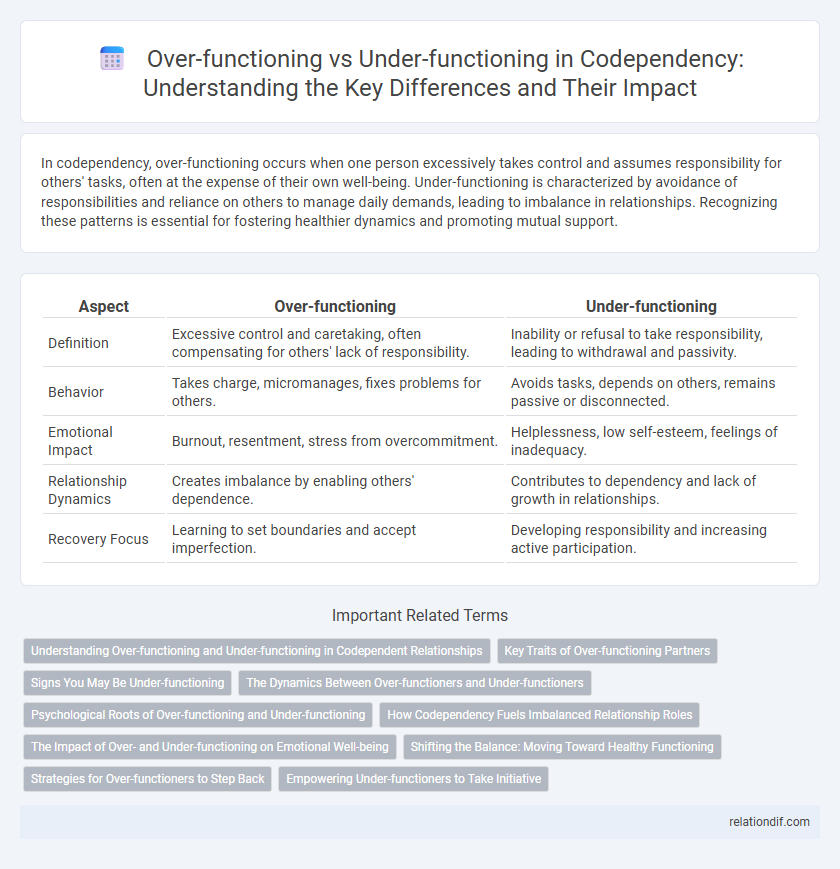In codependency, over-functioning occurs when one person excessively takes control and assumes responsibility for others' tasks, often at the expense of their own well-being. Under-functioning is characterized by avoidance of responsibilities and reliance on others to manage daily demands, leading to imbalance in relationships. Recognizing these patterns is essential for fostering healthier dynamics and promoting mutual support.
Table of Comparison
| Aspect | Over-functioning | Under-functioning |
|---|---|---|
| Definition | Excessive control and caretaking, often compensating for others' lack of responsibility. | Inability or refusal to take responsibility, leading to withdrawal and passivity. |
| Behavior | Takes charge, micromanages, fixes problems for others. | Avoids tasks, depends on others, remains passive or disconnected. |
| Emotional Impact | Burnout, resentment, stress from overcommitment. | Helplessness, low self-esteem, feelings of inadequacy. |
| Relationship Dynamics | Creates imbalance by enabling others' dependence. | Contributes to dependency and lack of growth in relationships. |
| Recovery Focus | Learning to set boundaries and accept imperfection. | Developing responsibility and increasing active participation. |
Understanding Over-functioning and Under-functioning in Codependent Relationships
Over-functioning in codependent relationships involves taking excessive responsibility for others' needs, often leading to burnout and enabling unhealthy behaviors. Under-functioning occurs when one avoids responsibility or depends excessively on others, fostering resentment and imbalance within the relationship. Recognizing these patterns is crucial for establishing healthier boundaries and promoting mutual support.
Key Traits of Over-functioning Partners
Over-functioning partners in codependency often exhibit excessive control, taking responsibility for others' emotions and problems while neglecting their own needs. They demonstrate a strong need to fix and manage situations, which can lead to burnout and resentment. This behavior typically masks deep-seated fears of abandonment and a desire for validation through caretaking.
Signs You May Be Under-functioning
Signs you may be under-functioning in codependency include constant feelings of helplessness, difficulty making decisions without reassurance, and relying heavily on others to manage day-to-day responsibilities. This pattern often leads to chronic procrastination, low self-esteem, and an inability to set or maintain personal boundaries. Recognizing these symptoms is crucial for addressing the imbalance and fostering healthier, more autonomous behavior.
The Dynamics Between Over-functioners and Under-functioners
Over-functioners in codependent relationships often take excessive responsibility, suppressing their own needs to support under-functioners who may avoid accountability or struggle with self-management. This dynamic creates an imbalanced cycle where over-functioners enable under-functioners' dependency, reinforcing patterns of control and helplessness. Recognizing these roles is crucial for breaking the codependency loop and fostering healthier, more autonomous interactions.
Psychological Roots of Over-functioning and Under-functioning
Over-functioning in codependency often stems from deep-seated fears of abandonment and low self-worth, driving individuals to take excessive responsibility for others to gain approval and control. Under-functioning arises from feelings of helplessness and anxiety, leading individuals to withdraw and avoid tasks to escape perceived inadequacy or failure. Both behaviors are rooted in childhood experiences of inconsistent caregiving and unmet emotional needs, which shape maladaptive coping mechanisms in adult relationships.
How Codependency Fuels Imbalanced Relationship Roles
Codependency fuels imbalanced relationship roles through patterns of over-functioning and under-functioning, where one partner excessively takes responsibility for the other's needs while the other increasingly relies on that support. Over-functioning manifests as controlling behaviors, caretaking, and sacrificing personal boundaries, whereas under-functioning emerges as passivity, avoidance of accountability, and emotional dependence. This dynamic perpetuates unhealthy cycles, reinforcing an imbalance that hinders individual growth and mutual respect.
The Impact of Over- and Under-functioning on Emotional Well-being
Over-functioning often leads to chronic stress and burnout, as individuals take excessive responsibility for others while neglecting their own needs, impairing emotional well-being. Under-functioning can cause feelings of helplessness and low self-esteem due to reliance on others and avoidance of personal responsibility, negatively affecting emotional stability. Both patterns disrupt healthy emotional regulation and contribute to anxiety, depression, and strained relationships.
Shifting the Balance: Moving Toward Healthy Functioning
Over-functioning in codependency often manifests as taking excessive responsibility for others' emotions and problems, leading to burnout and resentment, while under-functioning involves withdrawal and avoidance, which can enable dysfunction and stagnation in relationships. Shifting the balance toward healthy functioning requires cultivating self-awareness, setting clear boundaries, and fostering mutual accountability, enabling both partners to contribute authentically. Implementing therapeutic strategies such as cognitive-behavioral approaches and mindfulness can support this transition by promoting emotional regulation and interdependence.
Strategies for Over-functioners to Step Back
Over-functioners in codependent relationships can benefit from setting clear boundaries to reduce their excessive responsibility and encourage others' independence. Practicing self-awareness and mindful communication helps them recognize when to step back and allow others to take initiative. Engaging in self-care routines and seeking support through therapy or support groups promotes healthier relational dynamics and personal growth.
Empowering Under-functioners to Take Initiative
Empowering under-functioners to take initiative involves encouraging self-efficacy and fostering decision-making skills while setting clear expectations. Providing supportive feedback and opportunities for small, manageable challenges helps build confidence and reduces reliance on others. Creating a balanced dynamic between over-functioning and under-functioning enhances autonomy and promotes healthier relationship patterns.
Over-functioning vs Under-functioning Infographic

 relationdif.com
relationdif.com